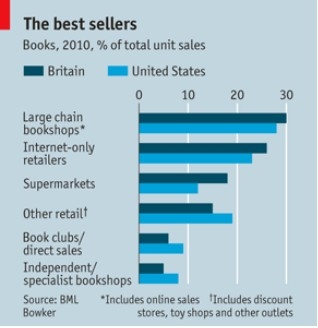
Business Bookselling Spine chilling
商業(yè) 圖書銷售 毛骨悚然
Mass-market retailing changed publishing before the e-book
大規(guī)模零售市場(chǎng)改變出版業(yè)以應(yīng)對(duì)電子書
SNAZZY technology is a twist in a narrative already several chapters long.
時(shí)髦的技術(shù)作為發(fā)展的轉(zhuǎn)折點(diǎn)早已成為歷史。
Mass-market retailing has changed the publishing industry: these days books are as likely to be found beside steaks and saucepans as they are to be bought in specialist stores.
大規(guī)模零售市場(chǎng)已經(jīng)改變了出版行業(yè):現(xiàn)在書在食物超市等和肉隔壁柜臺(tái)就可以買到。
The story turns on whether broader changes in bookselling will stifle literature.
這個(gè)現(xiàn)象又產(chǎn)生了一個(gè)疑問,就是圖書銷售進(jìn)一步的改變是否會(huì)扼殺文學(xué)。
Dan Brown will survive. Would Dante?
丹?布朗將會(huì)幸存,但是但丁呢?
For most of the past century, governments across Europe protected book prices; many still do.
在上世紀(jì)的大部分時(shí)期,歐洲政府實(shí)行了圖書價(jià)格保護(hù),許多直至今日依然如此。
Even in America, apart from dime-store romances, few titles were sold outside bookshops.
即使在美國,除了廉價(jià)商店出售的言情小說,其他一般只能在書店里買到。
But in the 1970s stores like Borders and Barnes & Noble applied a supermarket maxim to print: pile them high and watch them fly.
但是在上世紀(jì)70年代,一些書店如鮑德斯和巴諾把超級(jí)市場(chǎng)的理念應(yīng)用到了印刷品:書架高聳,汗牛充棟。
Waterstones did the same thing in Britain and top titles started selling in the hundreds of thousands, even millions.
水石書店在英國實(shí)行了同樣的策略,排行榜上的暢銷書賣出了成千上萬,甚至數(shù)百萬冊(cè)。
Just as book superstores forced out many independents, so supermarkets and other mass retailers have since crowded the book chains (see chart).
自從隨處可見的圖書連鎖店的出現(xiàn),許多獨(dú)立書店都被擠出市場(chǎng),超級(jí)市場(chǎng)和其他大型零售商也是同樣排擠他們(如圖)。
In Britain, when price regulation was disbanded in 1997, supermarkets rushed in and now sell a quarter of all books, according to the way that Nielsen, a market-research outfit, calculates it.
根據(jù)市場(chǎng)調(diào)查機(jī)構(gòu)尼爾森的計(jì)算,當(dāng)1997年英國解除價(jià)格管制后,超級(jí)市場(chǎng)蜂擁而至,如今占領(lǐng)了圖書市場(chǎng)的四分之一。
Belgium and Finland mimicked this trend.
比利時(shí)和芬蘭的情況如出一轍。
This has been good for readers: in Britain the average price of a book has fallen by 15% since 2003, reckons BML Bowker, a book-marketing consultancy.
這曾是消費(fèi)者的福音:圖書市場(chǎng)咨詢公司BML Bowker估計(jì),自2003年以來,英國圖書的平均價(jià)格下跌了15%。
And demand has grown: consumers spend the same amount on books, so they must be buying more.
同時(shí),需求增長了:消費(fèi)者花費(fèi)了同樣多的錢,因此他們一定購買了更多的圖書。
Those independent bookshops that survived the chain war in America and Britain have held sales and prices steady.
在美國和英國的圖書聯(lián)營之戰(zhàn)中幸存下來的獨(dú)立書店,其銷量和價(jià)格保持了穩(wěn)定。
Meanwhile, mass retailers find books such a draw that they lure in customers by selling some titles at a loss.
與此同時(shí),大的零售店將某些書虧本銷售,用這樣的方法來吸引客戶到他們的店鋪來購物。
Higher turnover should also be positive for publishers.
更高的流通量也應(yīng)有利于出版商。
But mass retailers demand discounts of up to 60% for bulk orders, shrinking margins.
但是,大型零售商對(duì)大宗訂單的折扣訴求動(dòng)輒高達(dá)六成,這減少了出版商的利潤空間。
All sides prosper when books sell quickly.
圖書暢銷的時(shí)候,全行業(yè)生機(jī)勃勃。
But, unlike groceries, if books don't sell, retailers return them to the publisher—and do not pay.
但圖書和生活用品不同,沒被銷售的圖書可以無條件退還給出版商。
So, when a book with a large print run flops, publishers end up with an expensive pile of recycling.
所以當(dāng)一本印數(shù)巨大的書滯銷時(shí),出版商最終只能付出高昂的代價(jià)回收。
That is why some publishers have stopped doing new deals with the likes of Costco, an American warehouse retailer, which likes to order very large print runs.
這也正是為什么一些出版商停止了和美國科思科這樣的連鎖企業(yè)簽定新合同的原因,他們傾向于大量訂貨。
Few people will mourn publishers' losses from increased price competition and new technology like e-readers.
很少有人會(huì)同情由于價(jià)格競(jìng)爭(zhēng)和新技術(shù)(如電子書)而利益受損的出版商。
The question is whether these trends undermine the quality of books which are being published, by breaking a business model that has let firms focus on variety and range.
問題是破壞企業(yè)專注于多樣化和范圍的商業(yè)模式的趨勢(shì),是否會(huì)降低出版圖書的質(zhì)量。
Publishers have good reason to shiver at the decline of traditional bookshops.
傳統(tǒng)書店的衰退已經(jīng)使得出版商不寒而栗。
To fund the discovery and promotion of new authors, they have relied on books that sell steadily over a number of years.
發(fā)掘和推銷新作者的資金依賴于于出版商多年來銷量穩(wěn)定的圖書。
Yet mass retailers stock a few hundred new blockbusters.
當(dāng)然大型零售商同時(shí)備有幾百部新暢銷書。
At first sight there is no reason for concern. New works are abundant—40% more titles came out in Britain in 2010 than in 2001.
乍一看似乎也無需緊張。新著層出不窮——相比2001年,2010年英國的新書目增長了40%。
But this obscures a starker trend: "mid-list" titles are selling in smaller numbers in America and Britain.
但這遮掩了一個(gè)糟糕的趨勢(shì),非暢銷書在美國和英國的銷量比以往更少了。
This matters for cultural life, because most literary fiction and serious non-fiction falls into that bracket and much of it could become uneconomical to publish.
這事關(guān)文化生活,因?yàn)榇蟛糠治膶W(xué)小說和嚴(yán)肅的非小說作品都屬于非暢銷書,其中大部分出版以后都成為了浪費(fèi)。



